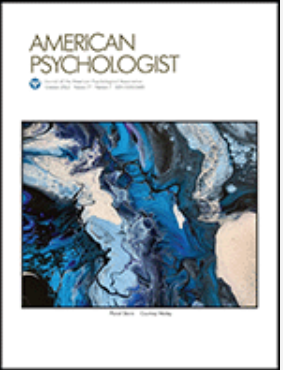克服路灯效应:照亮幼儿学习和发展的基础。
IF 12.3
1区 心理学
Q1 PSYCHOLOGY, MULTIDISCIPLINARY
引用次数: 0
摘要
长期以来,发展理论一直强调幼儿在整个生命过程中健康发展所需的一系列技能。然而,大多数儿童早期教育项目和政策的评估都集中于衡量一系列有限的能力。在本文中,我们将探讨儿童早期干预研究中的这种 "路灯效应",并提出一套初步的技能,我们认为这些技能应与传统的测量结果一起,作为学前期(即 3-5 岁)干预的优先目标。这些技能被我们称为学习与发展的基础(FOLD)技能,既包括已被充分研究过的技能,也包括新出现的技能,如好奇心、创造力、自我调节和执行功能、批判性思维、透视能力和自我内部表征。为了更好地了解 FOLD 技能作为更实用、更有效、更具包容性的幼儿计划和政策目标的潜力,我们回顾了有关每种技能的可塑性、可测量性、预测有效性和普遍性的研究。最后,我们提出了该领域未来的发展方向,包括需要:(a)制定更具包容性的 FOLD 技能分类法,将目前遗漏的与边缘化人群相关的能力纳入其中;(b)以可扩展和可操作的方式测量这些技能;以及(c)加强或修改干预策略,以优化学龄前阶段这些 FOLD 技能的发展。(PsycInfo Database Record (c) 2024 APA,保留所有权利)。本文章由计算机程序翻译,如有差异,请以英文原文为准。
Overcoming the streetlight effect: Shining light on the foundations of learning and development in early childhood.
Developmental theory has long emphasized a range of skills that young children need for healthy development across the life course. Nevertheless, most evaluations of early childhood programs and policies have focused on measuring a somewhat limited set of competencies. In this article, we explore this "streetlight effect" in early childhood intervention research and propose an initial set of skills that we argue should be prioritized alongside traditionally measured outcomes as targets of intervention during the preschool period (i.e., between ages 3 and 5 years). These skills, which we call the foundations of learning and development (FOLD) skills, include both well-studied and emerging constructs such as curiosity, creativity, self-regulation and executive function, critical thinking, perspective taking, and internal representations of self. To better understand FOLD skills' potential as more practical, effective, and inclusive targets of early childhood programs and policies, we review research regarding each skill's malleability, measurability, predictive validity, and universality. We end with a set of future directions for the field, including the need to (a) formulate a more inclusive taxonomy of FOLD skills that incorporates currently omitted competencies relevant to marginalized populations, (b) measure these skills in scalable and actionable ways, and (c) enhance or modify intervention strategies to optimize the development of these FOLD skills in the preschool period. (PsycInfo Database Record (c) 2024 APA, all rights reserved).
求助全文
通过发布文献求助,成功后即可免费获取论文全文。
去求助
来源期刊

American Psychologist
PSYCHOLOGY, MULTIDISCIPLINARY-
CiteScore
18.50
自引率
1.20%
发文量
145
期刊介绍:
Established in 1946, American Psychologist® is the flagship peer-reviewed scholarly journal of the American Psychological Association. It publishes high-impact papers of broad interest, including empirical reports, meta-analyses, and scholarly reviews, covering psychological science, practice, education, and policy. Articles often address issues of national and international significance within the field of psychology and its relationship to society. Published in an accessible style, contributions in American Psychologist are designed to be understood by both psychologists and the general public.
 求助内容:
求助内容: 应助结果提醒方式:
应助结果提醒方式:


